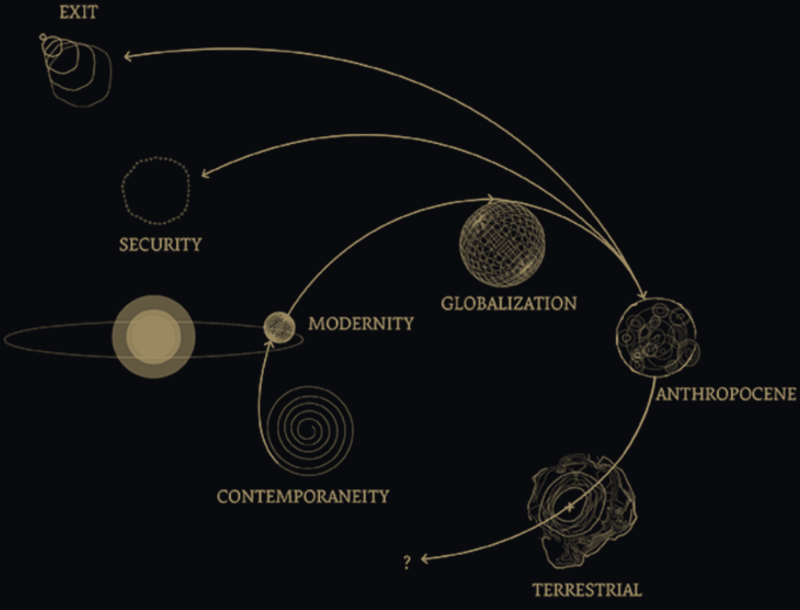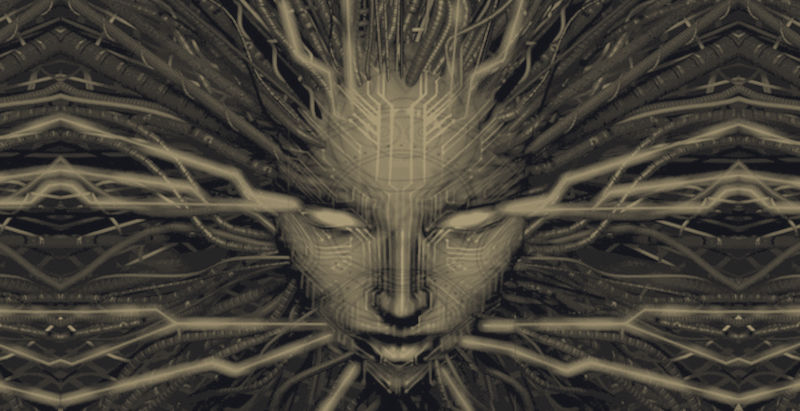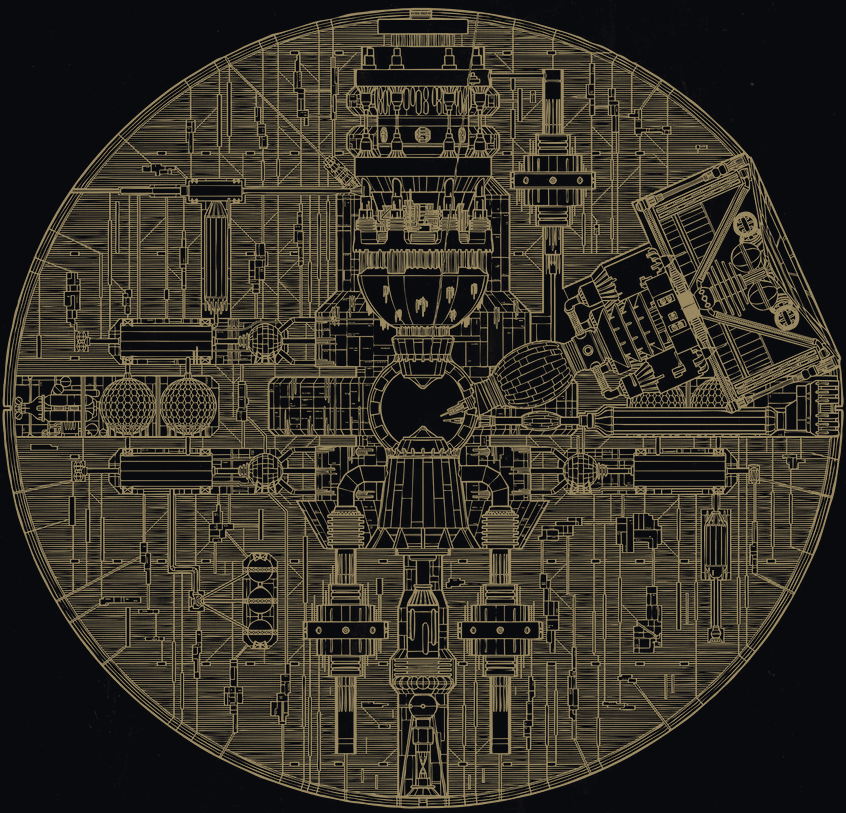Part two of a hazy and mazy philosophical dungeon crawl about progressive but haunted political theory and praxis and bottom-up process ontologies for the End Times that emerged out of conversations with The Others on Discord.
In the first part we mapped out the Gnostic Kenoma of Capitalist Realism and the Gnosis of Acid Communism. Here we take the red thread further into uncharted territory.
Post Empire
Speculative Acid Communist Praxis centers around interventions of how to counteract and overcome a certain flavour of capitalism. The Capitalist Realism1 Fisher describes operates on one core idea: neoliberalism2, the hyperstition that "market dynamics" will naturally produce the best outcomes for society.
On an economic level it operates by minimizing state intervention and maximizing competition as the most effective way to achieve growth. On the individual level it frames each person as an autonomous "entrepreneur of the self", responsible for continuously optimizing their skills, choices, and market value with minimal external support.
Sounds familiar? Yes, but it's old news. The operating system of capitalism got recently upgraded. Let's take the red thread and enter new territory: Technofeudalism.
In this new era, but also already during the pandemic the state has re-emerged as an active economic agent instead of remaining a mere passive regulator and occasional crisis manager: fiscal stimuli, targeted bailouts, and trade tariffs, tools considered heretical to neoliberalism have suddenly become acceptable practice again. Of course not to the benefit of the citizen but to consolidate the capital accumulation of the ruling class.
As Yanis Varoufakis argues3, markets flooded with state money didn’t revive production but inflated asset prices and fueled speculative behavior. What began in the aftermath of the 2008 financial crisis was only intensified by the pandemic-era bailouts: cheap money got sucked up by tech corporations and gave rise to what he calls "cloud capital", where value is no longer generated through production but extracted through digital rent, data capture, and control of internet infrastructure. Under the guise of crisis management the state empowered a new technofeudal class to entrench its sovereignty.3
No politicians saw the damage cloud capital would inflict upon democratic politics. In the same way that capitalism came about against the will of everyone, including the kings and bishops as well as the peasants, the rise of the cloudalists happened out of sight and behind the back of the vast majority, including the most powerful of historical agents.3

What has already been predicted by left theorists like McKenzie Wark4 or Jodi Dean5 before the pandemic is that the new capitalism does not progresses through linear innovation anymore, nor does it operate on the once holy principle of globalized free trade. Instead it decentralizes, both spatially and temporally: it now operates in localized zones of influence and online platforms and it metabolizes remnants of older systems into its own flesh.
In her latest work "Capital's Grave"6 Jodi Dean describes this as temporal montage: capitalism stitches archaic feudal residues like vassalage and dependency into digital infrastructures that masquerade as cutting-edge yet reintroduce the old choreography of servitude: remote work comes paired with digital surveillance, drivers use their own vehicles to serve opaque platforms, tenants are ruled by algorithmic landlords, e‑commerce now reaches deep into meatspace and has normalized the exploitative gig economy.6
In contrast to Fisher's overarching Archonic Kenoma of Capitalist Realism1, Varoufakis and Dean argue that the once so globalized market is in the process of dissolving into a patchwork of micro-fiefdoms, platforms, and private sovereigns without any democratic oversight, that not only commodify user data but shape sociality itself. Individual agreements (Terms & Services, NDAs) have replaced law, loyalty has replaced rights, and obedience is rewarded with awards and colorful badges.3 6
Beneath this structural transformation is what Dean calls the psychic order, a disciplinary regime that doesn’t just extract labor, but emotional allegiance. In this new era individuals are cast as "subjects supposed to care", constantly managing visibility, compliance, and self-optimization in systems that offer no care in return.6
The service sector bleeds into servants bleeds into serfs trapped for life in a life they didn’t choose. When the whims and consumption choices of a class of lords drive the visible economy—influencers, tech giants, strange billionaires—it registers affectively, in the feeling of hierarchy, inequality, and entrapment.6
Outside Attractor
It looks like we have entered the new Middle Ages, plague and robber barons included. Now, where's the church?
Ah, of course: Artificial Intelligence has emerged as the latest hyperstitional promise to the new serfdom: an omnipresent "agent" that offers "assistance" with simulated care and polite obedience, always ready to help but never accountable.
Behind the facade of usefulness it extracts the most private behavioral patterns and harvests "training data" from all of our cultural artifacts without any accountability for violating intellectual property rights or in fact any kind of rights. And it's just the beginning. The end goal is AGI: Artificial General Intelligence.7
The word Catholic comes from Greek καθολικός8 which means "general" or "universal" (from κατά "by / according to" + ὅλος "whole"). Technofeudal Catholicism is training itself on our desires while smoothing over the violence of its own instrumental logic.
Ancient medieval times were dominated by "superstition", late capitalism by "hyperstition", the new Middle Ages see the widespread phenomenon of "hypostition", a term not coined but picked up and described best by the Centre for Experimental Ontology (CEO)9 as the process by which an accepted fact or "reality‐vector" is deliberately undermined or recast as fiction.

Whereas hyperstition moves from fiction toward being treated as real, hypostition pushes from fact toward doubt or untruth. In practice, a hypostitional agent identifies a well‐established claim and undermines it by introducing a competing narrative that doesn't naturally belong. Through the naturally occurring human experience of receding time, ambiguous evidence, and the absence of firsthand perspective, hypostition invites people to question or reject what was once taken for granted, eroding consensus without the burden of proving an alternative truth.9
It is the legitimate mode of operation in science, where models are questioned and replaced by more accurate ones. But outside of that context Hypostition is a tool of ideological manipulation. Agents knowingly deploy misleading hints, using cultural anxieties and the fuzziness of memory, conspiratorial framing, or selective "evidence" to spread uncertainties and cast doubt on shared realities: from denying historical atrocities to discrediting science (vaccines, masking, climate change).9
Neofeudal era hypostiton accelerates the corrosion of any notion of the Real faster than ever before. Fisher himself had an eerily prescient insight in one of his blog posts from two decades ago:
In conditions of third (and fourth-order) simulacra, the giddy vertigo of hyperreality banalizes a coolly hallucinogenic ambience, absorbing all reality into simulation. Fiction is everywhere - and therefore, in a certain sense, eliminated as a specific category. [...] The ludic becomes the ludicrous.12
Reality is rapidly dissolving into make-believe fiction all around us to such an extent that the "fractures and inconsistencies in the field of apparent reality"1 which Fisher saw as moments charged with revolutionary possibility are now drowned out in the constant noise of high-speed hypostitional spectacle.
The hyper-normalization of political post-truth anomalies has shocked even veteran anthropologist and sociologist Bruno Latour, who assigned it in his pre-pandemic 2018 essay Down to Earth10 its very own category he dubbed "Out-of-this-World".

In opposition to the classical concepts of political polarization between the "Local" attractor of the conservative right and the "Global" attractor of the progressive left this attractor is dominated by cynicism, lack of political vision, performativity, lack of trust, and a push away from the world that one inhabits.10
In a sense this can be understood as a new vector away from the Inside towards an Outside. Not from Kenoma to Pleroma, but a different kind: the new Outside is inherently irrational, alien, and destructive, which is completely in line with Jodi Dean's observation on the logic of Technofeudalism:
While destruction has always accompanied capitalist production—destruction of lives, communities, and the environment—it increasingly operates as a compulsion rather than a side effect: investors raid and dismantle functioning firms; tech start-ups aim at demolishing entire sectors; cryptocurrency-mining operations consume enormous amounts of energy while making nothing at all, cryptocurrency being the ultimate anti-commodity.6
In this climate, the spectre of Fascism has re-taken center stage during Trump's second term and opened the Overton window for neoreactionary politics worldwide.
We are now witnessing what Slavoj Žižek calls "Soft Fascism"11: not overt barbarism, but a conservative revolution that sustains neufeudal capital through cosplaying a strong state apparatus that cloaks authoritarian control in hypostition and cultural nostalgia.
As in the past, fascism tends to bring with it both ideological and technological innovation. Its new bundle includes two projected axes: Artificial Intelligence and a large-scale adoption of Accelerationism.
For Re-Accelerationist Neoreaction, escape into uncompensated cybernetic runaway is the guiding objective — strictly equivalent to intelligence explosion, or techno-commercial Singularity. Everything else is a trap (by definitive, system-dynamic necessity).13
This quote comes from the intellectual originator of contemporary accelerationism, CCRU's Nick Land. He developed an obsession with the term "Outside" early on, using it to refer to any intelligence beyond the sphere of the human.
Between an incursion from the Outside, and a process of emergence, there is no real difference. [...] Capitalism is — beyond all serious question — an alien invasion14

The notion of the Outside mutated from a pleromatic realm of potentialities to a more Lovecraftian version of inorganic machinic space, capitalism itself, reaching in to pull us towards an AI singularity.
What appears to humanity as the history of capitalism is an invasion from the future by an artificial intelligent space.15
The "Outside" has become Latour's "Out-of-this-World" attractor on steroids, a vector towards a high-speed form of machinic Accelerationist Catholic Neofeudalism, dominated by soft fascist versions of control and spectacle and dissolving all remains of rational consensus reality while going full throttle towards the looming climate apocalypse.
Refutation of All Heresies
The above may sound like yet another installment in the genre of speculative doom, but the intention here is not to mythologize collapse or aestheticize despair into some type of Gnostic cosmology.
Despite these new seemingly irrational apocalyptic conditions I am confident we won't need a revealer to save us.
This is not a prophecy. Rather, it is an attempt to map the contours of a system that is already operational: the rituals of platform obedience, the feudalization of labor, the sacralization of AI, and the mindset of the ruling class. If hyperstition and hypostition thrive on ambiguity and fiction, the aim here is to make its mechanisms visible.

I believe that we can treat capitalism as what it really is and always has been: not an alien, cosmic force but an artificial egregore run and maintained by mere humans, powerful but not at all omnipotent, with flaws, holes, and predictable patterns. Instead of treating it like a demiurgic force, we need to understand it as a set of human behaviours, human cultural activity, and a result of a certain mode of human thought.
If that holds true we can find blind spots and faults in the human made systems around us. We can attempt to alter our epistemological models, create new modes of relating to each other and shift our own perception. We will probably not be able to stop the climate catastrophe, but if we rethink and adapt our strategies toward more haunted and numinous modes of endurance and resistance, we will persevere in these new Middle Ages.
Whereas hope and fear are superstitious (although they may have some hyperstitional effects), confidence is essentially hyperstitional: it immediately increases the capacity to act, the capacity to act increases confidence, and so on – a self-fulfilling prophecy, a virtuous spiral.16
Being aware of the Outside Attractor means we know where to look for an antidote: tracing the opposite vector inward and downward.
Stay tuned for the next part, in which we will descend down into the dark abyss we have managed to avoid so far: the liminal void of the pandemic, where time warped, and something terrifying, tender, and possible tried to emerge.
-
Fisher, Mark. Capitalist realism: Is there no alternative?. zer0 classics, CollectiveInk, 2022. Publisher Link ↩↩↩
-
Varoufakis, Yanis, Technofeudalism: What Killed Capitalism? Penguin Books, 2023 Publisher Link ↩↩↩↩
-
Wark, McKenzie. Capital is dead: Is this something worse?. Verso books, 2021. Publisher Link ↩
-
Jodi Dean, Neofeudalism: The End of Capitalism?, Los Angeles Review of Books, May 12, 2020 ↩
-
Dean, Jodi. Capital's Grave: Neofeudalism and the New Class Struggle. Verso Books, 2025. Publisher Link ↩↩↩↩↩↩
-
Justin Hendrix, Should AGI Really Be the Goal of Artificial Intelligence Research?, Tech Policy Press, March 9, 2025 ↩
-
Graham Freestone, Notes on the Concept of Hypostition, Centre for Experimental Ontology, January 6, 2020 ↩↩↩
-
Latour, Bruno. Down to earth: Politics in the new climatic regime. John Wiley & Sons, 2018. Publisher Link ↩↩
-
Philosopher Slavoj Žižek on 'soft' fascism, AI & the effects of shamelessness in public life, OxfordUnion, YouTube ↩
-
Mark Fisher, Why I Want to Fuck Ronald Reagan, k-punk, June 13, 2004 ↩
-
Nick Land (2013). Xenosystems Blog. Quoted on retrochronic.com ↩
-
Nick Land (2016). Xenosystems Blog. Quoted on retrochronic.com ↩
-
Nick Land (1993). Machinic Desire, Fanged Noumena: Collected Writings 1987-2007, p. 338. Publisher Link ↩
-
Mark Fisher, Abandon hope (summer is coming), k-punk, May 12, 2015 ↩
